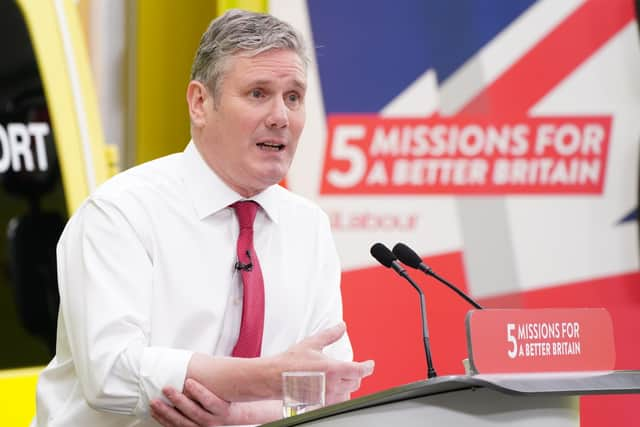Keir Starmer NHS: reaction to Labour’s health mission explained as experts insist ‘investment will be key’
This article contains affiliate links. We may earn a small commission on items purchased through this article, but that does not affect our editorial judgement.
and live on Freeview channel 276
“Investment will be key” if Labour wants to achieve its ambitions, a leading think tank has said, after Sir Keir Starmer unveiled his plans to reform and “save” the NHS.
Speaking at an ambulance station in Braintree, Essex on Monday (22 May), Starmer warned that the NHS would not survive another five years under a Conservative Party government. He said there need to be “big shifts” in the way the health service operates if it is to become “sustainable”, outlining plans to prioritise prevention, make better use of technology, and shift care away from hospitals and into the community.
Advertisement
Hide AdAdvertisement
Hide AdThe Holborn and St Pancras MP then made bold claims about his plans to target individual health issues, pledging to reduce deaths by heart disease and stroke by a quarter within 10 years and ensure that 75% of all cancer is diagnosed at stage one or stage two. He also announced plans to “revolutionise” mental heath treatment in order to reduce suicide rates - adding that suicide being the main cause of death in young people is a statistic that “should haunt us all”.
No one would argue with the sentiment and ambition behind these pledges, but the Labour Party leader has received criticism for not being upfront about where the funding for these plans will come from.
Starmer argued that Labour has “always said how it will fund proposed measures that would cost more”, such as by pledging to pay for training more doctors and nurses by abolishing non-dom status - but when asked by journalists for specifics about his latest announcements, the MP insisted that “it is not all about money”.
However, leading think tank the Institute for Public Policy Research (IPPR) has said while it “backs core aspects” of Labour’s health mission, “investment will be key” if it wants to succeed in reforming the NHS.


‘Investment alongside bold reforms will make such a target believable’
Advertisement
Hide AdAdvertisement
Hide AdChris Thomas, Head of IPPR’s Commission on Health and Prosperity, said: “The NHS was created at a time when conditions like tuberculosis remained among the biggest killers.
“But today’s challenges are different. A shift to more preventative care – and more care in the community – is long overdue. Labour is right in its ambition to create a 21st century plan for a 21st century NHS.
“But there also needs to be a plan for investment alongside these bold reforms to help make such an aspirational target believable. Investing in the things that drive healthier lives, like good housing, a healthy diet, and lower smoking rates... will be critical for delivering healthier people and a healthier economy.”
‘We need real investment to make a real difference’
Elsewhere, other leading charities have also highlighted the importance of investment. Commenting on Starmer’s pledge to reduce death by suicide, Mubeen Bhutta, Head of Policy, Public Affairs & Campaigns at Samaritans, told NationalWorld: “Suicide rates in England are as high now as they were 20 years ago, so any pledge to prioritise this issue and save lives is welcome. But, we need ambitious action and real investment to make a real difference and drive rates down to their lowest-ever levels.”
Advertisement
Hide AdAdvertisement
Hide AdShe added that because two in three people who die by suicide are not in touch with mental health services in the year leading up to their death, it is “vital that suicide prevention efforts are tackled from every area of government to ensure that people are supported at every possible opportunity.”
“Suicide is a major public health issue that devastates families and communities, but it is preventable,” Ms Bhutta insisted. “The time for real action is now; saving lives can’t wait.”
Meanwhile, the British Heart Foundation praised Labour for its focus on tackling heart disease and stroke, with the charity’s chief executive, Dr Charmaine Griffiths, saying she is “heartened” to see that the party “recognises the bold ambition needed to better prevent, diagnose, treat, and focus research on one of the nation’s biggest killers.”
She continued: “Research has helped us make great strides in saving lives from heart attacks and strokes over the last 60 years. But the pace of progress had slowed even before the pandemic, and heart and circulatory disease death rates have now increased.
Advertisement
Hide AdAdvertisement
Hide Ad“With the current extreme and unrelenting pressure on the NHS, we could see this concerning rise in cardiovascular disease death rates continue unless all parties commit to prioritising NHS heart care, better preventing heart disease and stroke, and powering science to unlock future treatments and cures.”
Dr Griffiths added that currently, cardiovascular disease is responsible for one death every three minutes in the UK.
Comment Guidelines
National World encourages reader discussion on our stories. User feedback, insights and back-and-forth exchanges add a rich layer of context to reporting. Please review our Community Guidelines before commenting.
